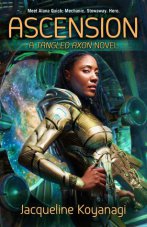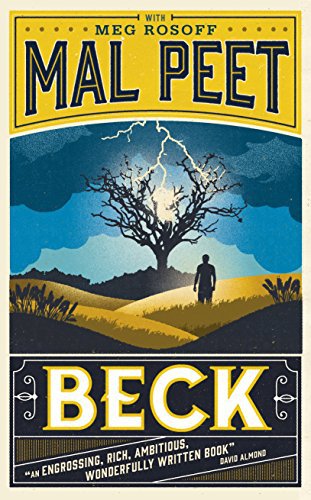Ascension by Jacqueline Koyanagi
 5/5 stars
5/5 stars
“Pain is just the world wanting us to pay attention to it because we’re so damned beautiful it can’t stand being ignored.”
Alana Quick is stuck; she repairs spaceship engines for a living and doesn’t make enough to pay for the advanced medication she needs for her chronic pain. Her and her aunt Lai both suffer from a disease, Mel’s, that puts their bodies under enormous stress and pain when they don’t take medication. Alana dreams of being able to afford treatments for her and Lai someday, and the only thing she needs is a steady job. The opportunity finally arises when Alana gets a visit from a spaceship captain in search of her sister. Alana makes the gut decision to stow away on the ship in hopes that, once they are far enough away, the crew will be forced to keep her on board for the remainder of their current mission. This is Alana’s only chance at making a better life for her and her aunt, maybe the crew of this ship can understand that and take her onboard as an engineer.
WOW. This book has a mix of everything I’ve ever wanted. It has a space ship, a crew of multi-alien-cultures, a main character of color with a disability, and many queer characters whose plot lines don’t revolve around being queer. If this sounds like something you’d love, like it does for me, read on!
Sidenote: This book is VERY comparable to A Long Way to a Small, Angry Planet. I loved both books and would recommend them to basically anyone who likes science fiction.
Ascension is full of diversity. One of my favorite parts about science fiction is getting to read about new, unique alien cultures and species, and Jacqueline Koyanagi really incorporated that into this book. Really, all of the characters ware anthropomorphic (mostly,,,), but all of them are from different cultures and go through life with unique things in mind. The author really does an amazing job portraying that they all have their own sets of values and beliefs about how the world works. Often, it’s hard to give each character their own personhood, especially when there are many individuals in a regular length novel, but Jacqueline does it very well.
This is the first adult book I’ve read that really puts chronic illness and pain in the spotlight. It’s a very easy thing to get wrong, by trivializing it or romanticizing it, but when it’s done right, it is done RIGHT. Alana is an independent woman with a strong work ethic and heart full of determination. In addition, she also suffers from a chronic illness. This disease, Mel’s, acts up unexpectedly. Alana has some good days and some not so good days, just like a real person with chronic pain. When Alana has flare-ups, she takes her medication as prescribed and works through it. Seeing her push through the horrible pain and tremors is heartbreaking because real people suffering with real invisible illnesses experience this all the time. I think it’s very important to normalize books that have main characters with disabilities because actual people like that are EVERYWHERE.
I also want to mention the representation of people of color in Ascension. Many books introduce characters by giving a physical description—hair color, skin tone, and clothing style. Ascension does this by mentioning that Alana pulls her “locs” back out of her face and the dark complexion of her skin. The thing that this book does that most others don’t is that it doesn’t let the reader forget that Alana is a person of color. Her locs, the texture of her hair, and the color of her skin are all mentioned multiple times. Jacqueline did not write Alana and just add on the fact that she’s a person of color, she wrote Alana AS a person of color. This is so important for representation.
Everything about this book was an A+ for me– The characters, the storylines, the writing, and the takeaways. It’s everything you could ever want from a sci fi book. This book made me happy in so many ways but there are two I want to highlight: Ascension does an amazing job portraying what it’s like to live with a chronic illness and it successfully uses minorities (sexuality and race wise) as more than just plot devices. Thank you, Jacqueline Koyanagi, for this brilliant book.
Advertisements Share this:




